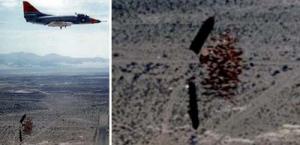SyriaRussia may be committing war crimes by using banned munitions, targeting civilians: Amnesty
Russian air strikes in Syria have killed hundreds of civilians and caused massive destruction in residential areas, striking homes, a mosque, and a busy market, as well as medical facilities, in a pattern of attacks that show evidence of violations of international humanitarian law, Amnesty International in a new briefing published on Tuesday. Evidence, including photos and video footage, gathered by Amnesty suggests that the Russians have used unguided bombs in densely populated civilian areas, as well as internationally banned deadly cluster munitions. Weapons experts who analyzed images of Russian air attacks said the nature of the destruction caused by the attacks indicated possible use of fuel-air explosives (also known as “vacuum bombs”), a type of weapon particularly prone to indiscriminate effects when used in the vicinity of civilians.

After dropped, cluster bomb casing opens to release hundreds of shaped-charge bomblets // Source: commons.wikimedia.org
Russian air strikes in Syria have killed hundreds of civilians and caused massive destruction in residential areas, striking homes, a mosque, and a busy market, as well as medical facilities, in a pattern of attacks that show evidence of violations of international humanitarian law, Amnesty International in a new briefing published on Tuesday.
The report, “Civilian objects were not damaged”: Russia’s statements on its attacks in Syriaunmasked, highlights the high price civilians have paid for suspected Russian attacks across the country. The report focuses on six attacks in Homs, Idlib, and Aleppo between September and November 2015, which killed at least 200 civilians and around a dozen fighters. The briefing includes evidence suggesting that Russian authorities may have lied to cover up civilian damage to a mosque from one air strike and a field hospital in another. It also documents evidence suggesting Russia’s use of internationally banned cluster munitions and of unguided bombs in populated residential areas.
“Some Russian air strikes appear to have directly attacked civilians or civilian objects by striking residential areas with no evident military target and even medical facilities, resulting in deaths and injuries to civilians. Such attacks may amount to war crimes,” said Philip Luther, Director of the Middle East and North Africa Program at Amnesty International.
“It is crucial that suspected violations are independently and impartially investigated.”
The Russian authorities have claimed that their armed forces are only striking “terrorist” targets. After some attacks, they have responded to reports of civilian deaths by denying they killed civilians; after others, they have simply stayed silent.
Amnesty International interviewed eyewitnesses and survivors of attacks as well as examining video evidence and images showing the aftermath of attacks, aided by analysis by weapons experts. The attacks were identified as suspected Russian air strikes by cross-referencing details of each attack with statements from the Russian Ministry of Defense announcing “terrorist” targets struck, or from details about the nature of the attack in witness testimony.
Amnesty International says thatthe organization’s research into these strikes indicate that there were no military targets or fighters in the immediate vicinity of the areas that were struck. This suggests that the attacks may have violated international humanitarian law and may, in some circumstances, constitute war crimes.
